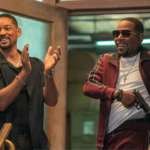
President Emmanuel Macron has called snap parliamentary elections later this month in the wake of a big victory for his rival Marine Le Pen’s National Rally in the European Parliament vote.
The far-right party is on course to win 32% of the vote, exit polls say, more than twice that of the president’s Renaissance party.
Announcing the dissolution of parliament, he said the two rounds of voting would take place on 30 June and 7 July, a few weeks before the Paris Olympics.
Mr Macron made the dramatic and surprise decision in a televised address from the Élysée Palace an hour after voting closed and exit polls had been declared in France’s EU elections.
His decision came not long after National Rally’s 28-year-old leader, Jordan Bardella, had openly called on the president to call parliamentary elections.
“I have heard your message,” the president told French voters, “and I will not let it go without a response.”
“France needs a clear majority in serenity and harmony,” he said, adding that he could not resign himself to the far-right’s progress “everywhere in the continent”.
Now barely two years into his second term as president, Mr Macron already lacks a majority in the French parliament, and though this European vote in theory has no bearing on national politics, he clearly decided that continuing his mandate without a new popular consultation would place too much of a strain on the system.
The upcoming parliamentary elections also won’t affect Mr Macron’s own job, as they are separate from the presidential elections and his term as president still runs for three more years.
Ms Le Pen, who has twice been defeated by Mr Macron in presidential elections, immediately reacted, saying her party was “ready to exercise power, ready to put an end to mass immigration”.
Calling a snap election is a huge surprise for the country, and a huge risk for President Macron.
He could have reacted differently. He could have just kept going, explaining the far right’s massive victory as a European aberration which would be corrected at more important elections.
He could have trusted to the impending European football championship in Germany and above all the Paris Olympics to keep people’s minds off politics for a couple of months.
That was certainly how the Paris commentariat thought he would take his party’s rout.
But one can only assume the president had seen this coming, and planned his response in advance.

Certainly the result was an almost exact replica of the polls, so he would have had plenty of time to consider his options.
The fact is that he is stuck.
Without a majority, getting any bill through the National Assembly is already a struggle. With most of the country now so clearly against him, any new legislation – for example the upcoming budget – could have proved explosive.
So he has plumped for “clarity”. If National Rally has the votes then, he says, they should be given the chance to govern.
Obviously the president will hope his own Renaissance party can mount a fight-back at the elections on 30 June and 7 July – or that other parties will do better too.
But he must appreciate that the odds favour another victory for National Rally. Maybe not one so sweeping as Sunday’s result, but enough for it to become the biggest party in parliament.
At which point we might well have a Prime Minister Marine Le Pen, or indeed Jordan Bardella.



